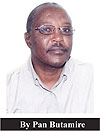To many Rwandans, a tourist is a moneyed, happy-go-lucky elderly gentleman or lady from some distant land: North America, Europe or the Far East. Alternatively, he/she is an unworldly student on a shoe-string budget, rucksack on the back, (grand-) son/daughter to those moneyed elders.


To many Rwandans, a tourist is a moneyed, happy-go-lucky elderly gentleman or lady from some distant land: North America, Europe or the Far East. Alternatively, he/she is an unworldly student on a shoe-string budget, rucksack on the back, (grand-) son/daughter to those moneyed elders.
We see both categories as sharing the eagerness to see different animals.
For that, hardly any of us would imagine ourselves as tourists. The idea of an animal that we hold is of a prey to be hunted for meat or a predator eager to turn us into a meal. So, go to Nyungwe in south-western Rwanda and you will meet a Rwandan who imagines a gorilla to be no different from a colobus monkey.
What we don’t know is that all animals of the wild are beautiful creatures that are a feast for the eyes. We may be familiar with small animals like antelopes, hogs, monkeys and others. We may even have visited Akagera National Park and seen the big animals that grace it: elephants, buffalos, lions, leopards, hippos, the lot.
But have you ever posed to observe the 5-metre high giraffe, its offensive smell notwithstanding? The next time you visit, take time to watch the conduct of those ‘tallies’ and you’ll see that they share a lot with humans. (Tongue in cheek, if you’ll permit……..)
The "stink bull” (the elderly male), true to the ‘sugar-daddy’ character, prefers a younger female partner, just as the ‘chicks’ prefer ‘seasoned elders’! But, unlike our kindly mothers, the ‘mama’ prefers to give her young one an early push, by giving birth while standing. The baby hurtles 3 metres to the hard ground, from where it shakes off its numbness and starts walking after only a while!.........
That, for instance, you didn’t know. And it’s not only the giraffe. All animals have an interesting story to tell. When you take your time to go and see these animals, don’t simply throw a cursory look at them. Take your time to listen to their story.
Of course, even if it is only for looking, an addition of more animals in Akagera Park may tickle Rwandans out of their apathy. There is no reason why the okapi, sole cousin to the giraffe, cannot be bought in Ituri Forest, D.R. Congo, and be introduced to Rwandans. Think of the lumbering one-tonne rhino; plenty can be bought in Kenya. Or the 3-metre, 155-kg, flightless ostrich that can garner a running speed of close to 80 km/hour.
Tourism, of course, is far larger than animals. In any case, Rwanda is not supposed to be a depository of wild animals, or else we’d be having no business here. Rwanda is organic and dynamic and, like those animals, she is speaking to us. Tourism should be about listening to her story.
When I set off on a journey to the Rusumo Fall, on the Rwanda-Tanzania border, it is as a student that I travel. Right from the house, I go imbibing lessons in Agriculture, Geography, History, Human Relations, Politics, Economics, Physics, Biology, ad infinitum. I look at the different landscapes, check out historical sites, talk to the people and observe their lifestyles.
On my last visit there, I observed those round, high but flat-topped hills, just before you reach the wondrous fall, and marvelled. You’d think somebody took time to shape them, with one of them sporting a ‘penki-shave’, to boot! In Rwanda-speak, the ‘penki-shave’ is where you have your head shaven but a cluster of hair is left on top of your dome. It denotes the American ‘punk’ fad, I guess?
All the people I talked to were full of "Now we have this, now we have that.” If it was not a ‘Girinka’ cow, it was health insurance (‘mutuelles de santé’), a kitchen garden, clean water, a school or a health-centre – if not hospital – nearby. And the burbling went on and on.
I’d been to Kalongi before that. Kalongi, in western Rwanda, does not boast those round ‘penki-hills’ and the people don’t burble about their new lifestyles.
Everywhere seems to be one hill that ‘falls’ right into Lake Kivu. The grandeur of the lake is the one that takes your breath away, as it comes stealthily into view while you are ‘falling’ down the hill and seemingly into the lake! As for the story of the people, it came to me in my dream, in the morning from about 5.
In the dream, somebody was telling me, in a melodious sing-song, how everyone now had milk for the children…. the same list as I’d later hear in Rusumo. Then I slowly woke up, and it was to the same voice. Realising that it was ‘live’, I quickly wrapped a towel around me and went to the balcony, where I sat to watch, and listen to, the three men rowing their dugout canoe in Lake Kivu.
Such beauty I’d not beholden. The men were not only boatmen – they were griots, village bards. Every part of Rwanda has its beauty; its story.
For you and me, domestic tourism should mean listening to Rwanda.


